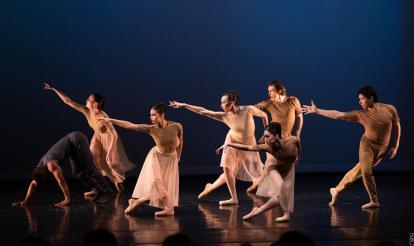Explore the lives and music of three extraordinary Jewish pianists: Harriet Cohen, Myra Hess and Irene Scharrer.
Delve into their navigation of the classical music industry, World Wars, and Jewish identity in the twentieth century. Listen to live performances of significant works from their careers by Academy students, see materials from the British Library’s Music Collections, and hear discussions, from a panel of passionate academics, of their political-musical challenges and achievements.
The programme features Cohen’s only published work, Scharrer’s meticulous Chopin and an iconic Hess Beethoven performance.
In collaboration with the Royal Academy of Music and the British Library.
This event will take place both online and in person. To attend in person, click the "Book Now" button on this page. To attend in online, click here.
Academy Musicians
Xiaowen Shang
Xiaowen Shang is a versatile pianist, harpsichordist, and musician with a passion for early, classical, and contemporary music. Her repertoire spans Renaissance composers such as Antonio de Cabezón and William Byrd to contemporary figures including Olivier Messiaen, Pierre Boulez, and Brett Dean. She has collaborated with renowned musicians and composers such as Steven Isserlis, Joanna MacGregor, Rachel Podger, Brett Dean, Dame Imogen Cooper, Lawrence Power, and Adrian Brendel. Xiaowen is also enthusiastic about interdisciplinary projects, including live visuals, theatre, and silent film improvisation.
As an active performer, Xiaowen has played at prestigious venues including the Royal Albert Hall, Royal Festival Hall, Wigmore Hall, the Victoria and Albert Museum, and Brighton Dome. She has also appeared as a soloist and chamber musician at numerous festivals, including the Brecon Festival, Petworth Festival, and Dartington Festival. Highlights of Xiaowen’s upcoming summer engagements include Grieg’s Piano Concerto with the Bushey Symphony Orchestra under the baton of George Vass in May, solo recitals across the UK, and the Siegla Festival in Iceland with THI in August.
Xiaowen recently completed her Master of Music degree with Distinction under the guidance of Joanna MacGregor at the Royal Academy of Music, where she was a Bicentenary Scholar. She was also awarded the DipRAM and achieved a perfect score in her final recital. Starting in September 2024, she began her studies as a PhD candidate on a scholarship at the Academy, supervised by Neil Heyde and Mei-Ting Sun. She earned her Bachelor's degree with First Class Honours and received the Edwin Samuel Dove Prize for special merit.
Katya Grabova
Described as “a pianist of fearless brilliance and restrained passion,” Katya Grabova is establishing herself as one of the most compelling young pianists of her generation.
In 2025, she won the Aspen Piano Concerto Competition, leading to a performance with the Aspen Conducting Academy Orchestra at the Aspen Music Festival. She has performed at major music festivals including Rheingau Musik Festival and Leeds International Concert Season. Her recent appearances include performances at prestigious venues such as the Southbank Centre, Shanghai Concert Hall, the Great Hall of the Moscow Conservatory, the Tchaikovsky Concert Hall, and Lielais Dzintars Concert Hall.
A prizewinner at the Nutcracker International Contest and the Neuhaus International Music Festival, Katya has performed with the Moscow Philharmonic and the Royal Academy of Music orchestras. She was also awarded the First Prize of the Mayor of Moscow Grant in piano.
Dr Briony Cox-Williams
New Zealand pianist and researcher Dr Briony Cox-Williams is a lecturer at the Royal Academy of Music in London. As a pianist she has given concerts both as a soloist and as a chamber musician, working with instrumentalists and singers, with a particular concentration on neglected repertoires, composers and performers of the nineteenth- and early twentieth centuries. She is currently working on a book about women of the nineteenth century Royal Academy of Music. This highlights the people, places and concepts involved as important factors alongside repertoire.
She has published articles on women composers such as Fanny Hensel and Lili Boulanger, and on nineteenth-century performance practice in song. Other areas of research and teaching activity include nineteenth-century music aesthetics, concert programming, and the way in which gendered uses of language are coded into music theory and practice.
Full Music Programme
2 Bach duets: Wachet Auf, duet Sleepers Awake (JS Bach, BWV 645)
Sanctify Us by thy Goodness, duet Harriet Cohen Bach Chorale (JS Bach, BWV 22)
5 Gibbons pieces (Harriet Cohen, recorded 1947)
Russian Impressions (Harriet Cohen,1913)
Intermezzo III in C from Four Pieces for Piano (Brahms, Op. 119, performed by Hess for the opening Blitz concert October 1939)
[ INTERVAL]
3 Chopin Etudes: C minor Revolutionary, Ab Aeolian Harp, Gb Butterfly
Movement 3 of Piano Sonata No. 30 in E major (Beethoven, Op. 109)
Meet the Panel
Frankie Perry is Digital Music Collections Specialist at the British Library, and catalogued the Harriet Cohen Papers (Part II) there as part of her previous role as Music Manuscripts and Archives Cataloguer. Frankie holds a PhD in musicology from Royal Holloway University of London, following previous study at the University of Oxford. She currently has ongoing research in the areas of special collections (including archives of women musicians) and digital musicology.
Danielle Roman is a PhD candidate in music history at New York University. Her research examines music’s linking of various minority groups and radical politics to the movement for Irish independence from 1880-1960. One chapter focuses on Harriet Cohen’s intersecting support for Irish nationalist, Zionist, and feminist causes. Recently, she was awarded the Larkin interdisciplinary Fellowship from the American Conference for Irish Studies and two grants from the U.S.-Ireland Commission for Educational Exchange.
Danielle is currently based in the UK, supported by a GRI Fellowship at NYU London and a Visiting Research Studentship at the University of Cambridge, where she previously completed a Masters. Danielle is also on the Editorial Board of the Journal of the Society for Musicology in Ireland as well as a Board member and Soprano for the London Philharmonic Choir.

